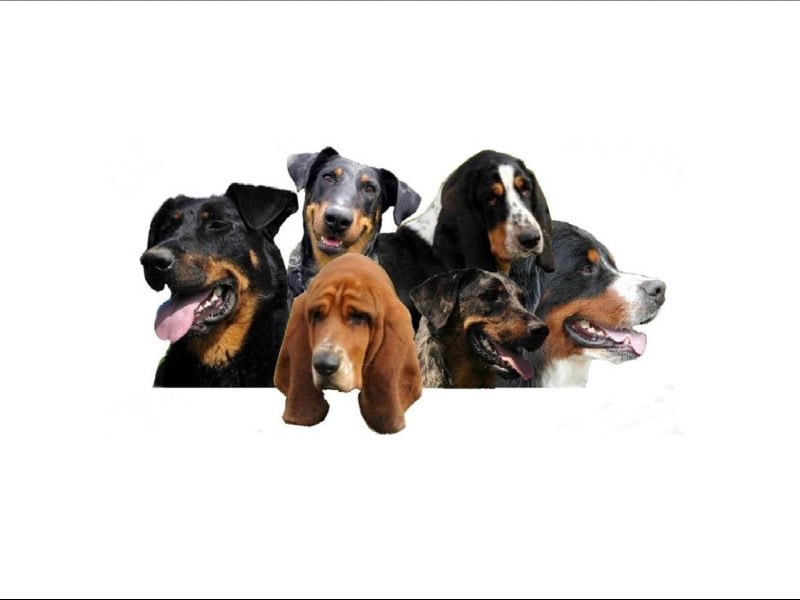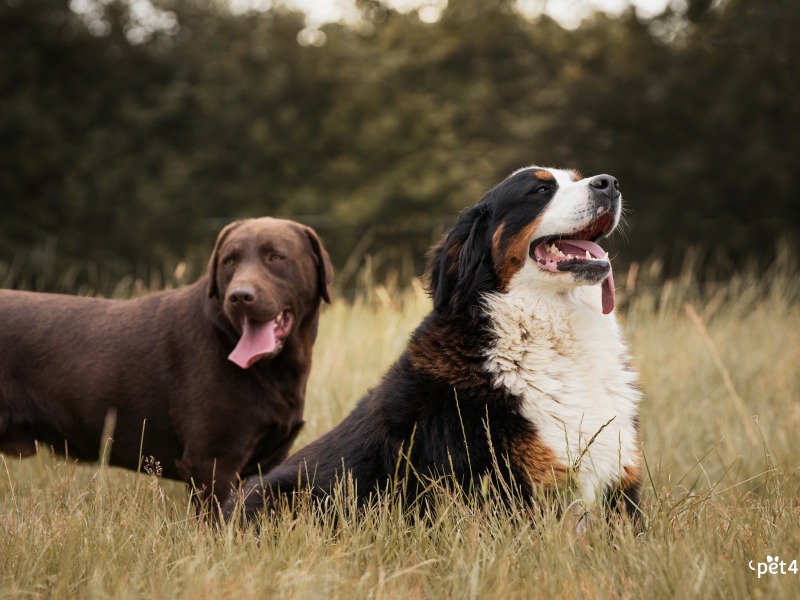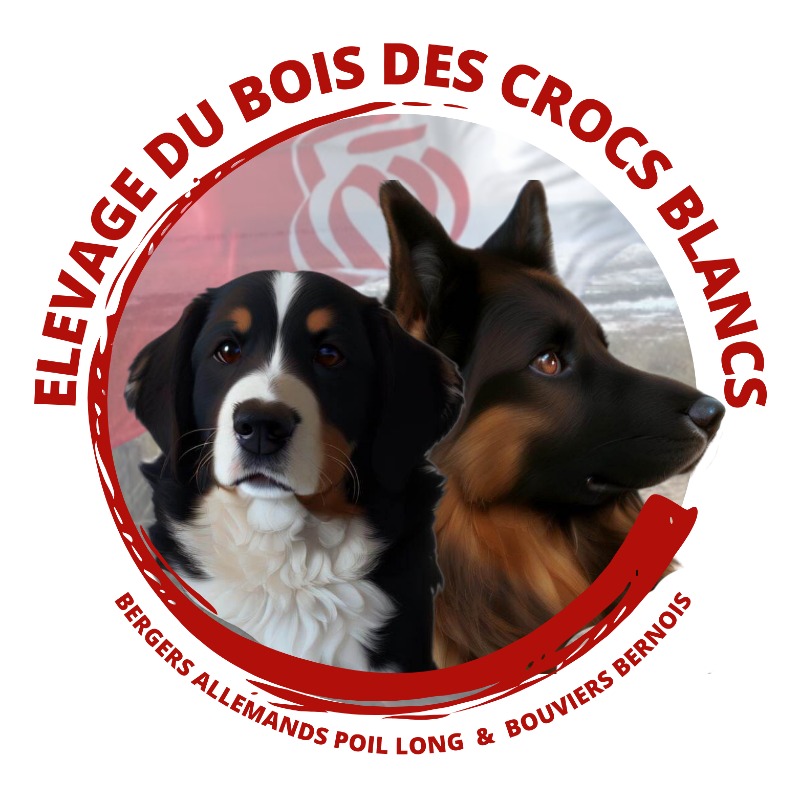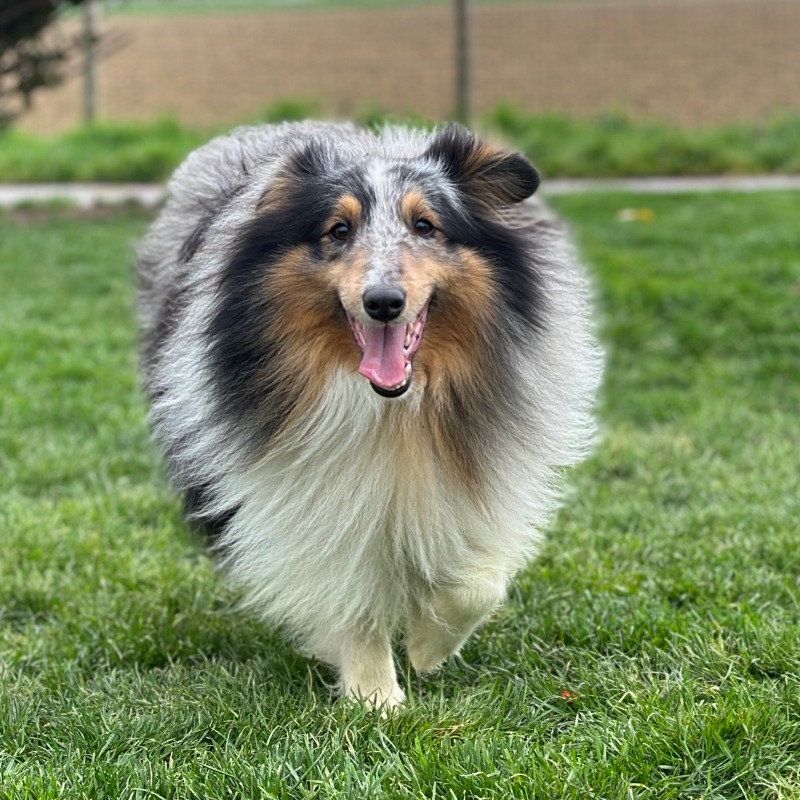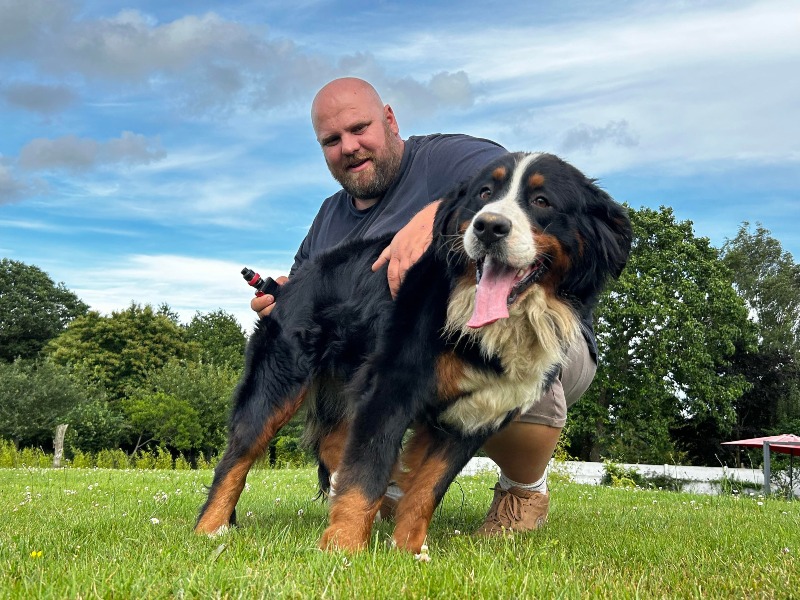Bernese mountain dog
Autres noms : Berner sennenhund, Bernese cattle dog, Berner sennenhund, Bouvier bernois
Discover the Bernese Mountain Dog, a mountain dog with a gentle and protective nature. With its beautiful tricolored coat and affectionate personality, this loyal companion is perfect for families and outdoor enthusiasts. Learn all about its needs, training, and unique traits.
Awareness of acquiring an animal
Adopting or breeding a dog is a responsibility that must be carefully considered. Dogs are loyal companions that require time, attention, and constant care. Whether for leisure, passion, or professional breeding, it is crucial to understand the specific needs of each breed. Provide them with a loving and stimulating environment, and avoid any impulsive acquisition that could harm their well-being. Be a vigilant and committed owner for a happy and healthy companion.
To learn more about animal welfare, we invite you to consult our FAQ by clicking the button below:
Origins and history
The Bernese Mountain Dog finds its origins in the Swiss mountains, particularly in the Emmental region and the Sarine valley. Its ancestors primarily stem from working dogs of the mastiff type, present in the area for centuries. Used by farmers, these dogs were essential for herding livestock, pulling carts, and assisting on farms, thanks to their robustness and endurance.
The history of this breed dates back to the Middle Ages, where it gained popularity due to its versatility. Over the years, natural and human selection has helped refine its physical and behavioral traits, leading to the recognition of the Bernese Mountain Dog as a distinct breed. In the 1900s, enthusiasts began to standardize and promote the breed, establishing selection criteria to preserve its remarkable characteristics.
Today, the Bernese Mountain Dog is appreciated for its gentle temperament, loyalty, and intelligence. It has become a well-recognized family companion while continuing to excel in various canine activities, including herding work and competitions.
Physical characteristics
The Bernese Mountain Dog is a large dog with a robust and well-proportioned stature. It can measure between 58 and 70 cm at the shoulder, with males generally being larger than females. Its weight ranges from 30 to 50 kg, making it a powerful and muscular dog.
The coat of the Bernese Mountain Dog is one of its most distinctive features. It has a double coat, consisting of a dense undercoat and a long, shiny outer coat. Typical colors include black with white and rust markings. The white spots are often found on the muzzle, chest, and paws, while the rust markings are usually located above the eyes and on the legs.
The head is broad, with a slightly rounded forehead and well-developed cheeks. The eyes, which are oval-shaped and dark brown, convey a sense of gentleness and intelligence. The medium-sized, drooping ears contribute to the friendly and affectionate expression of this breed. In summary, the Bernese Mountain Dog is an impressive dog, with a noble appearance and a charming character.
Character
The Bernese Mountain Dog is a breed known for its balanced and friendly temperament. This dog is distinguished by its gentle and affectionate nature, making it an excellent companion for families. They generally get along well with children and are very protective of their loved ones. This ability to form strong bonds makes them appreciated and loyal pets.
Furthermore, these dogs possess great intelligence and are often easy to train. They enjoy working and can excel in various activities such as agility or rescue work. Their desire to please and their responsiveness to commands make them well-suited for family life, provided they are socialized from a young age.
However, it is essential to note that these dogs require particular attention. Their need for daily exercise and human interaction is crucial for their well-being. They can become destructive if they get bored or are left alone for too long. Taking care of their training and providing them with a stimulating environment is vital for their optimal development.
Life expectancy
The life expectancy of a Bernese Mountain Dog generally ranges between 7 and 10 years. This relatively short lifespan is often attributed to various hereditary health factors. The specifics of their breed make them prone to certain medical conditions, including cancers, joint issues, and heart diseases.
The size of the dog plays a significant role in its longevity. Larger breeds, like this one, tend to live shorter lives than smaller breeds. It is crucial for owners of this breed to stay attentive to signs of illness and to schedule regular veterinary check-ups. Early detection of health problems can help prolong the animal's life.
A balanced diet and regular exercise are also essential for maintaining the animal's health. Proper care, including weight management and special attention to their overall well-being, will greatly contribute to their quality of life. In summary, although life expectancy may be limited, a loving environment and adequate care can truly make a difference.
Exercise and activity needs
The Bernese Mountain Dog is a breed that stands out due to its impressive size and friendly temperament. To ensure its physical and mental well-being, it is essential to meet its exercise and activity needs. These dogs require a combination of daily exercise to stay healthy and happy. On average, they need between 60 to 90 minutes of activity per day, divided between walks, play, and training sessions.
Regular walks are vital for the Bernese Mountain Dog. They not only provide the necessary exercise but also social stimulation and opportunities to explore their environment. Games like frisbee or outdoor runs can also stimulate their natural instincts and strengthen the bond with their owner. By incorporating varied activities, boredom and stress can be prevented, which can lead to undesirable behaviors.
Furthermore, the Bernese Mountain Dog is intelligent and enjoys mental challenges. Training exercises or problem-solving games are recommended to nurture their curiosity and learning ability. Some examples include learning tricks, starting agility training, or even search games. Ultimately, an active and enriching lifestyle is essential to foster the happiness and health of this unique breed.
Recommended diet
The Bernese Mountain Dog, large and robust, requires a diet suited to its size and activity level. It is essential to provide high-quality food that is rich in protein and healthy fats to support muscle growth and energy. Kibble or wet food formulated for large breeds is generally recommended, as they contain the necessary nutrients in appropriate amounts.
Essential elements include animal proteins such as chicken, lamb, or fish, as well as omega-3 and omega-6 fatty acids to promote healthy skin and coat. Complex carbohydrates, such as brown rice or sweet potatoes, serve as a sustainable energy source. It is also crucial to ensure adequate mineral intake, particularly calcium and phosphorus, to ensure healthy bone development.
Finally, it's important to adjust portions based on age, weight, and activity level. Puppies and young dogs have higher energy needs, while adults require a balanced intake to maintain a healthy weight. Regular check-ups with the veterinarian help ensure that the diet remains appropriate throughout the dog's life.
Training and obedience
The Bernese Mountain Dog is a breed known for its gentle and balanced temperament, making it an excellent family companion. Training for this breed should begin at a young age to establish a solid foundation. Early socialization is crucial to help the dog get accustomed to various environments, people, and other animals. This can help prevent fearful or aggressive behaviors in adulthood.
Training the Bernese Mountain Dog should rely on positive methods, such as positive reinforcement. Rewarding good behaviors with treats, praise, or play can be very effective. This approach strengthens the bond between the dog and its owner while making learning more enjoyable. Training classes conducted by a professional can also be beneficial for acquiring specific skills and enhancing communication.
Finally, patience is essential. This breed is known for its intelligence, but it can sometimes be stubborn. Training sessions should be short and engaging to keep the dog's attention. With proper guidance and love, the Bernese Mountain Dog will become a well-behaved and balanced animal.
Behavior with children
The Bernese Mountain Dog is known for its gentle and affectionate temperament, making it an excellent companion for children. This breed is characterized by its patient and protective nature. They are generally very friendly and enjoy interacting with younger ones, creating a strong bond between them. Their large size can sometimes be impressive, but their kindness is a major asset in interactions with children.
Due to their protective instinct, these dogs tend to look out for children, giving them a guardian role. They are often vigilant and can detect uncomfortable or threatening situations, providing an extra layer of safety for families. This protective behavior is balanced by their need for socialization, which is essential to prevent any jealousy or possessiveness towards the children.
It is crucial to educate children on how to interact with these dogs, particularly by teaching them to respect personal space and canine communication signals. When properly socialized and trained, Bernese Mountain Dogs prove to be loyal friends and delightful playmates for children, fostering the creation of positive and lasting memories.
Compatibility with Other Animals
The Bernese Mountain Dog is generally recognized for its gentle and sociable nature. This dog has a balanced temperament that allows it to get along with a variety of other pets. Its protective instinct, combined with its kindness, makes it an ideal companion for families, but it is essential to ensure good socialization from a young age.
When it comes to cohabiting with other dogs, the Bernese Mountain Dog is often inclined to be friendly. However, initial encounters should be supervised to ensure that each dog respects the other’s personal space. Due to its imposing stature, it is important to monitor interactions with smaller animals to avoid any clumsy play behavior that could lead to injury.
Regarding cats and other small animals, the Bernese Mountain Dog can coexist peacefully, provided it has been well socialized. A gradual introduction is crucial for establishing a harmonious relationship. If the dog is correctly trained and introductions are handled carefully, a serene coexistence is entirely feasible.
Grooming needs
The Bernese Mountain Dog is a long-haired breed that requires regular grooming to maintain its health and well-being. Grooming is essential to prevent the accumulation of dead hair and to reduce the risk of dermatological problems. Weekly brushing is recommended, but during shedding season, it may be necessary to brush several times a week to manage hair loss.
Another important aspect of maintenance concerns the dog's nails. It is advisable to trim them regularly to avoid causing the dog pain or injury. This also contributes to proper balance and a healthy gait. Checking the ears and teeth is equally crucial. The ears should be cleaned carefully to prevent infections, while regular dental care can help prevent dental health issues.
Finally, proper grooming helps to strengthen the bond between the dog and its owner. It is an opportunity to spend time together while ensuring that the Bernese Mountain Dog remains in great shape. Regular grooming not only enhances the animal's comfort but also its appearance.
Health
The health of Bernese Mountain Dogs is a crucial topic for owners and breeders. This breed is often prone to several hereditary health conditions. Among the most common issues are hip dysplasia and elbow dysplasia, which can lead to arthritis and long-term joint pain. It is recommended to ensure that dogs are screened for these diseases before breeding to reduce the risk of genetic transmission.
Furthermore, Bernese Mountain Dogs are also predisposed to various types of cancers, including soft tissue tumors and lymphomas. Their large size and relatively short lifespan, which averages between 6 to 8 years, pose a challenge for owners wishing to provide a healthy life for their pets. Particular attention should be given to their diet and weight to prevent obesity, which can exacerbate joint problems.
Finally, regular veterinary visits, up-to-date vaccinations, and good dental hygiene are essential to maintaining the overall health of these dogs. Engaging in suitable physical activities is also vital to promote their mental and physical well-being.
Environment and habitat
The Bernese Mountain Dog is a breed of dog that originates from the mountainous regions of Switzerland, where it traditionally worked as a farm dog. This breed has been bred for its strength, versatility, and friendly temperament, making it an excellent companion. Well-suited to cooler climates thanks to its dense, triple-layer coat, it prefers temperate to cool environments, although it can acclimate to warmer climates provided it has sufficient shade and water.
Regarding its habitat, the Bernese Mountain Dog thrives in a space where it can expend energy. A fenced garden is ideal to allow the dog to move freely and engage in play. This dog also needs to be close to its family. It is not inclined to be left alone for long periods and can suffer from boredom or anxiety if isolated. An active family life, with hiking or outdoor activities, perfectly matches its energy needs. In summary, a loving and stimulating environment is essential for the well-being of this breed.
Name ideas
Choosing a name for a dog, especially for a breed like the Bernese Mountain Dog, requires considering several criteria. First of all, the name should reflect the dog’s personality and appearance. Bernese Mountain Dogs are known for their tricolor coat, their gentleness, and their protective nature. A good name can therefore evoke these characteristics while being easy to pronounce and memorable.
Next, it is advisable to choose a name that does not sound like common commands to avoid any confusion for the dog. A name with one to three syllables is generally more effective. Finally, a unique name can help your dog stand out from other animals while creating a special bond between you and them.
Here are about fifteen suggestions for names for a Bernese Mountain Dog: Tricolor, Barlow, Avola, Bella, Caramel, Freya, Hugo, Kira, Orion, Porthos, Saphir, Trixie, Vino, Zola, and Nestor. Each of these names captures an aspect of what makes this breed so special while remaining distinctive and easy to use in everyday life.
Average purchase price
The cost of acquiring a Bernese Mountain Dog can vary significantly based on several factors. Generally, the average price ranges from 1,000 to 2,500 euros. The costs primarily depend on the breeder, the lineage, and the quality of the animal.
Reputable breeders who commit to maintaining health and welfare standards often set higher prices. A puppy from a champion lineage or with verified health backgrounds can sell for between 1,500 and 2,500 euros. This often includes health tests, vaccinations, and the opportunity to receive breeding advice.
On the other hand, lower prices around 1,000 euros may be observed in less rigorous breeding conditions. This can raise concerns about the health and future behavior of the animal. It is therefore crucial to conduct thorough research and visit the breeding facilities before making a decision. Adoption is also an option to consider, with significantly lower fees, but availability may be less predictable.
Expenses
Owning a Bernese Mountain Dog entails recurring expenses that can add up quickly. On average, monthly costs can range from 80 to 150 euros, depending on the specific needs of the dog and the choices made by the owner.
Food is one of the main expenditure categories. A dog of this size requires high-quality food, with an average cost of around 40 to 70 euros per month. It is essential to choose kibble suitable for their size and age to ensure their health.
Veterinary expenses must also be taken into account. This includes vaccinations, regular check-ups, and preventive care. On average, these costs can account for about 20 to 30 euros per month. Ensuring the dog's good health is crucial to avoid unexpected costs related to illnesses.
Finally, one should not forget additional costs such as accessories, grooming, and possibly boarding or daycare. This can add another 20 to 50 euros per month. In summary, it is wise to plan a comfortable overall budget to ensure the well-being of this large animal.
Destination and usage
The Bernese Mountain Dog is a dog that stands out for its gentle and affectionate nature, making it an ideal companion for families. These dogs form deep bonds with their owners and generally get along well with children. Their sociable and friendly nature promotes harmonious interaction in a family environment. Thanks to their patience and calm temperament, they quickly become integral members of the household.
In terms of destinations, Bernese Mountain Dogs enjoy walks in natural places, such as parks, forests, and mountains. Their origins as working dogs in the Alps make them well-suited for outdoor activities. Many families take them on hikes during country holidays or even in the mountains, taking advantage of their endurance and zest for life. This allows them to enjoy the scenery while strengthening the bond with their owners.
In summary, the Bernese Mountain Dog is a loyal and affectionate companion, perfect for families that enjoy spending time outdoors. Its balanced temperament and adaptability make it a preferred choice for those seeking a warm presence in their home.
Legislation and regulation
The legislation regarding Bernese Mountain dogs varies significantly from country to country. In some states, this breed is recognized as suitable for family life, and the laws regulating their ownership primarily focus on animal welfare and owner responsibility. Socialization and training criteria are encouraged to prevent behavioral issues.
In contrast, stricter regulations exist in other countries. Some regions introduce restrictions regarding the sale, possession, or breeding of specific breeds, often based on public safety concerns. In this context, owners may be required to register with authorities or undergo mandatory training programs.
Additionally, sterilization initiatives may be imposed to reduce the canine population. In all cases, compliance with local laws concerning animal health and welfare is essential, and owners are encouraged to inform themselves about the regulations in force in their area.
Official recognition
The Bernese Mountain Dog is a dog breed originating from Switzerland, where it was historically used as a working dog on farms. The official recognition of this breed varies from country to country, but it is generally well established among international canine organizations.
In many European countries, notably Switzerland, France, and Germany, the Bernese Mountain Dog enjoys formal recognition from national canine organizations. This includes a certification and evaluation process that ensures compliance with breed standards. Breeders are often subject to stringent regulations to ensure the health and well-being of the animals.
In North America, particularly in the United States and Canada, the breed is also recognized by major canine organizations. Local breed clubs and dog shows help promote the characteristics and qualities of the Bernese Mountain Dog. These events also raise public awareness about the breed, thereby encouraging responsible adoption and breeding.
Globally, the Bernese Mountain Dog continues to gain popularity due to its qualities as both a companion dog and a working dog. Its official recognition in many countries reflects its appreciation as both a pet and an active dog. Ongoing efforts to preserve and promote the breed ensure its future in homes around the world.
Pedigrees
To obtain a pedigree for a Bernese Mountain Dog, it is essential to turn to recognized organizations that manage the records of this breed. Generally, two main categories of organizations stand out: breed clubs and kennel clubs.
Breed clubs play a fundamental role in preserving and promoting breed standards. The Bernese Mountain Dog Club, typically affiliated with a kennel club, is responsible for managing pedigrees and ensuring that registered dogs meet the breed criteria. These clubs also organize events such as dog shows and competitions, allowing owners to showcase their animals and promote good breeding practices.
Kennel clubs, like the Société Centrale Canine (SCC) in France, manage national databases for all dog breeds. They provide birth registration services and issue pedigrees while establishing strict breeding rules. Therefore, to obtain a pedigree, it is advisable to contact either a breed club or directly a kennel club, which will oversee the compliance and authenticity of the required documents. This also ensures lineage tracking and contributes to the health and well-being of the breed.
Prohibitions
The Bernese Mountain Dog, appreciated for its gentle character and protective nature, is subject to various regulations around the world. In some countries, laws specifically prohibit the ownership of certain breeds considered potentially dangerous. However, this breed is not commonly listed among the banned breeds.
In Europe, several countries enforce laws regarding breeds deemed at risk, but the Bernese Mountain Dog is generally not affected. The trend leans more towards promoting dog education and responsible ownership behavior. Some regions may impose specific requirements, such as mandatory sterilization or training programs for owners.
In the United States, restrictions often depend on local regulations. While some cities have implemented bans on specific breeds, the Bernese Mountain Dog is generally allowed. However, issues may arise related to the size and specific needs of this breed, particularly regarding space and physical activity.
In summary, although the Bernese Mountain Dog is not frequently subject to widespread bans, owners should always research local laws and ensure a safe and suitable environment for their pet.
Breeders of Bernese mountain dog
Want to see more breeders of Bernese mountain dog?
Check out the page of our directory listing all breeders of Bernese mountain dogClassified Ads of bernese mountain dog
No of bernese mountain dog classified ads are available on Preeders.
If you’re a breeder, sign up for free now and be the first to post a classified ad
Breed clubs of bernese mountain dog
No of bernese mountain dog breed clubs are currently registered on Preeders.
If you would like to highlight your breed club, sign up for free now and be the first to appear on this page.

